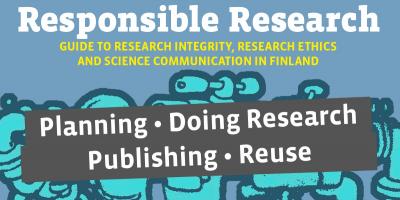Good behaviour is also part of responsible conduct of research.
“Good manners are the glue of society”, etiquette expert Helena Valkonen wrote in her book Hyvä käytös (Good behaviour).
Good behaviour means tact, consideration, and the same rules applying to everyone, and being obeyed. It makes social interaction easier, and creates a sense of togetherness and satisfaction.
Appropriateness, fairness and considering others are also included in the idea underlying responsible conduct of research. The starting point is taking responsibility for one’s own actions.
Appropriateness, fairness and considering others are also included in the idea underlying responsible conduct of research.
Common sense says that research work will be more productive and easier to evaluate, and that the scholarly community feels comfortable if other people’s opinions are respected, mutual trust inspires new ideas and criticism fosters debate.
In principle, this should not be particularly difficult.
In practice, bad behaviour is common in academia. Even real-life examples of the stereotypes found in scholarly jokes, of character-flawed professors who shout red-faced and taunt their colleagues, still exist.
Poor timekeepers break promises
In an ideal world, promises are kept and agreements are complied with. People who misuse other people’s time repeatedly violate these ideals.
Repeated late arrivals, failure to attend meetings and delaying project schedules communicate that the time of one person is more valuable than that of others. The same applies when this individual comes to a meeting unprepared and taps on the phone throughout.
Being busy is a common but poor excuse for this kind of arrogance. Typical reasons for being rushed are poor management of one’s schedules, greed and indifference. It is unfair for the bad behaviour of one person to burden others and downplay their efforts.
However, life can produce the unexpected so that the agreed deadline approaches too fast. In such cases, it is responsible to notify others immediately of the impending delay. This enables adaptation to the situation and negotiation of a new schedule.
Instead, it is irresponsible to take on new work that does not fit in one’s schedule because previous assignments are waiting for completion. Saying yes to everything is not necessary simply because someone asked. A polite refusal conveys professionalism, reliability and realism.
Constructive criticism can be productive
Differences of opinion and shaking up interpretations encourage thinking and produce new information. Creativity and courage suffer, however, if discussion is a harsh monologue from the loudest know-it-all or if the researcher puts words in the research subject’s mouth.
The most effective criticism is delivered in a way that feels good and justified, even when you are the one receiving it.
Producing new information and testing it become difficult if the researcher or the research subjects are afraid of participating. Behaviour must be appropriate for this reason, as well. The most effective criticism is delivered in a way that feels good and justified, even when you are the one receiving it.
The most skilled sparring partners challenge with encouraging questions and counterarguments that lead to new realisations. Polite language and justifying one’s viewpoints evoke trust and help improve the quality of work.
Is insulting people worth it?
Tone of voice and choice of words become even more important in e-mails and on social media. Unfamiliarity with new applications or physical distance from the discussants are not excuses for bad judgment or inappropriateness.
In the name of good behaviour – and thus responsible conduct of research – it is worth thinking for a moment about what to say to colleagues (or about them), and how and where to say it, not to mention the same regarding one’s research subjects. If the decision of a journal editor is not to one’s liking, is shouting at this person the solution?
Besides moderation and appropriateness, there is also the issue of what is forbidden. Insulting another researcher’s work or revealing confidential information may result in legal action. Besides this being misconduct in the sense of responsible conduct of research, it might break the law. Misconduct hardly increases interest in hiring the genius in question or collaborating with him or her in the future.
A leg up the career ladder
Good behaviour can be thought of as a way of improving one’s own career opportunities if plaudits and satisfaction do not suffice as a reward.
Those who are invited to participate in demanding writing projects and teams are people who have a reputation of being professional and pleasant to work with. If five experts are available, the one asked to contribute will be the one who keeps to the agreed deadlines and takes criticism as a routine improvement of the quality of work.
It is thus an advantage if one’s name is associated with trustworthiness and good conduct. More than knowledge of a subject matter is needed to make a professional impression. Information about the experiences of colleagues and research subjects spreads efficiently and opens new doors – or closes them.
More than knowledge of a subject matter is needed to make a professional impression.
Professional behaviour can boost one’s reputation and references. This is important for an individual’s career development in situations in which funds are limited and full returns on investments are expected.
Young people in particular, especially researchers who are only just starting to prove themselves, are the business cards of their mentors, teams, background organisations and their country, describing the situation in the field and its future.
Instead of being the most demanding rocket science, good behaviour is about everyday ethical choices, which are gratis. They only take “a pinch of goodwill, determination and care,” as we were reminded in the second edition of the Hyvä käytös guide, first published in 1947.
Pauliina Raento, Professor of Regional Studies, University of Tampere
Further reading:
Heliste, Maria (2014). Miksi käyttäydyt huonosti, kollega? Nuorten Lääkärien Yhdistys association, 13 August 2014. http://www.nly.fi/artikkeli/miksi-kayttaydyt-huonosti-kollega. Read on 18 January 2017.
Hyvä käytös sallittu – epäasiallinen kohtelu kielletty (2010). Centre for Occupational Safety, Helsinki. http://www.ttk.fi
Hyvän käytöksen opas (2006). City of Oulu, Oulu.
Työelämän sosiaaliset ja vuorovaikutustaidot (2012). Ennakoiva ohjaus työelämässä project.
Valonen, Helena (2014). Hyvä käytös. Kaikki mitä tulee tietää. Auditorium, Helsinki.
You might also be interested in
Tämä teos on lisensoitu Creative Commons Nimeä 4.0 Kansainvälinen -lisenssillä. Detta verk är licensierat under en Creative Commons Erkännande 4.0 Licens. This work is licensed under a Creative Commons Attribution 4.0 International license.


